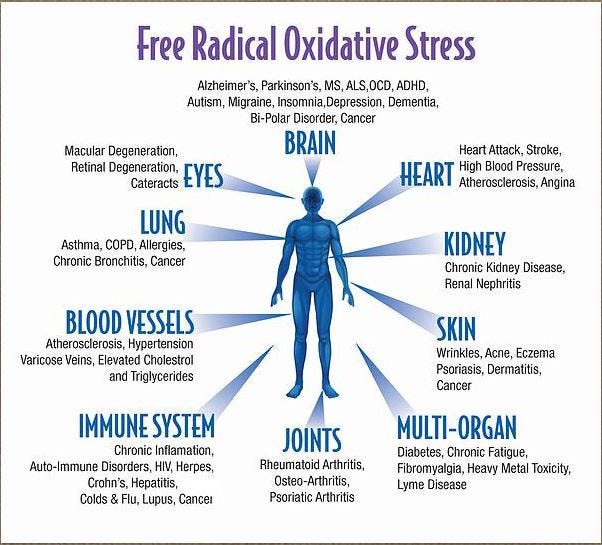BioNTech - bionanotechnology - The biological application of nanotechnology
In connection with nanotechnology,
OXIDATIVE STRESS IS THE KEY WORD
POST-VACCINATION ADVERSE EFFECTS:
"Reissue_5.3.6 Postmarketing Experience.pdf" (https://phmpt.org/wp-content/uploads/2021/11/5.3.6-postmarketing-experience.pdf. lists over 1200 ADVERSE EFFECTS OF SPECIAL INTERST after Pfizer C-19 injection
FDA Safety Surveillance of COVID-19 Vaccines: DRAFT Working list of possible adverse event outcomes https://www.fda.gov/media/143557/download page 16 (from October 22, 2020) lists 22 ADVERSE EVENTS
A Long List of Various Adverse Effects (VAERS) https://medalerts.org/vaersdb/findfield.php?TABLE=ON&GROUP1=SYM&EVENTS=ON&VAX=COVID19
WHAT DO THESE DIFFERENT ADVERSE EFFECTS HAVE IN COMMON?
THERE SEEMS TO BE ONLY ONE THING THAT IS COMMON TO THEM:
OXIDATIVE STRESS
Oxidative stress is a condition in which the body’s cells are exposed to an imbalance between free radicals and antioxidants. Free radicals are highly reactive due to their unstable nature. Antioxidants are molecules that can neutralize free radicals, preventing them from causing damage to cells. When the balance between free radicals and antioxidants is disrupted, oxidative stress occurs.
https://www.aactoday.com/disorders
Oxidative stress is known to cause over 200 diseases:
Acne, Aging, AIDS, Alcoholic paranoia, Alcoholism, Alimentary canal diseases, Allergies, Amyotrophic Lateral Sclerosis (ALS), Altitude sickness, Alzheimer’s Disease, Anemia, Angina pectoris, Ankylosing spondylitis, Anxiety, Anxiety disorders, Arteriosclerosis, Arthritis, Asthma, Ataxia, Atherosclerosis, Attention Deficit Disorder (ADD), Autism, Bacterial infection, Poor blood circulation, Blood vessel damage, Breathing difficulties, Bronchopulmonary disease, Burns, Bursitis, Cancer (esp. prostate, lung, breast, & skin), Canker sores, Carbuncles, Cardiovascular disease, Cerebral performance (impaired), Cerebral vascular insufficiency, Chronic bronchitis, Chronic Obstructive Pulmonary Disease (COPD), Claudication (intermittent), Congestive Heart Failure (CHF), Connective tissue damage, Convalescence, Cough, Cuts, Cystic fibrosis, Dandruff, Dementia (age-related), Dental caries, Diabetes (DM), Diarrhea, Down Syndrome, Emaciation, Epilepsy, Equilibrium disorder, Fatigue, Fever, Fibromyalgia, Gastritis, Graf rejection, Halitosis (bad breath), Headache, Heart attack, Heart Disease, Hemorrhoids, Hepatitis, Hepatotoxicity, Herpes, High blood glucose, High Blood Pressure (HTN), High Cholesterol, HIV, Hypertension (HTN), Immune disorders, Immune system problems, Indigestion, Infertility, Inflammation (swelling), Insect bites, Insomnia, Ischemia, Jaundice, Kidney damage, Leprosy, Liver cirrhosis, Liver fibrosis, Lumbago, Lymph tissue damage, Macular degeneration, Manic depression, Memory loss, Migraine headaches, Mucous membrane damage, Multiple Sclerosis (MS), Muscle energy loss, Pain, Panic attacks, Paracetamol hepatotoxicity, Paralysis, Parkinson’s disease, Periodontitis, Peripheral vascular disease, Piles, Pneumonia, Poison ivy, Premenstrual syndrome (PMS), Pseudoporphyria, Psoriasis, Psoriatic arthritis, Raynaud’s Disease, Reperfusion injury, Respiratory system diseases, Rheumatism, Rheumatoid arthritis, Schizophrenia, Sjogren's syndrome, Skin disorders, Skin inflammation, Sore gums, Sore throat, Sores, Stomach ulcers, Stress, Sunburn, Swollen glands, Syphilis, Thrombosis, Tinnitus, Tuberculosis, Ulcers, Unverricht-Lundborg Disease, Venous insufficiency (blood pooling in veins), Vertigo, Viral infection, Vision loss (age-related), Wounds, Wrinkles.
If your condition is not on the above list, check pubmed.gov and see if there have been any recent studies on it. Type in “(your condition), oxidative stress”.
https://drhyman.com/blog/2010/05/19/glutathione-the-mother-of-all-antioxidants/
Essential Glutathione: The Mother of All Antioxidants
IT’S THE MOST IMPORTANT MOLECULE you need to stay healthy and prevent disease — poor diet, pollution, toxins, medications, stress, trauma, aging, infections and radiation all deplete your glutathione.
https://www.ncbi.nlm.nih.gov/pmc/articles/PMC4630702/ The antioxidant master glutathione and periodontal health https://www.sciencedirect.com/science/article/abs/pii/S1568997209000561?via%3Dihub Glutathione: A key player in autoimmunity https://pubmed.ncbi.nlm.nih.gov/30651162/ Health Benefits of Culinary Herbs and Spices — (AND THOUSANDS OF OTHER AVAILABLE STUDIES)
This secret has been known for thousands of years. Ayurveda, for example, knew this secret:
“Like humans, plants need to protect themselves from toxins and pathogens that come from both inside and outside. Like human bodies, plants produce chemicals for this purpose. Not surprisingly, these chemicals can also be used by the human body, a fact that is well known to both Western and Ayurvedic pharmacology. Ayurvedic pharmacology (called dravyagu na) is fundamentally different from modern pharmacology. Dravyaguna uses plants (or parts of plants) as they occur in nature, with all their components. Western pharmacology - which uses a "machine" model of the organism - isolates active ingredients from plants and then (usually) synthesizes them. Most Western medicines are obtained this way from natural substances. Medical science tends to assume that replacing natural herbs with synthetic active ingredients is a clear leap forward. However, the active ingredient approach violates any synergies that exist between organic ingredients, which can be significant. In addition, many seemingly inactive ingredients have been shown to play significant health-promoting roles. [Contemporary Ayurveda]
They act as antioxidants, anti-inflammatory, anti-allergenic, anti-cancer, anti-ulcer and anti-hepatic agents.
TO PREVENT AND TREAT MOST DISEASES, OXIDATIVE STRESS MUST BE ADDRESSED







Another List of Diseases and Conditions Associated with Oxidative Stress:
The list includes (but is not limited to):
Autoimmune and degenerative diseases
Acetaminophen poisoning
Acne
ADD/ADHD
Addison’s Disease
Ageing
AIDS
Alopecia Areata
ALS (Lou Gehrig’s disease)
Alzheimer’s Disease
Anemia (hemolytic)
Angina, Spastic Angina, Unstable Angina
Ankylosing Spondylitis
Arteriosclerosis
Arthritis (rheumatoid)
Asthma
Autism
Autoimmune disease
Behcet’s Syndrome
Bipolar Disease
Bronchitis (Chronic)
Buergers Disease
Burns
Cachexia
Cancer (every one studied)
Candida infection
Cardiomyopathy (idiopathic)
Cataracts
Concussion
Colitis
Coronary artery disease
Crohn’s disease
Cystic Fibrosis
Depression
Dermatitis (Atopic)
Diabetes
Eczema
Emphysema (COPD)
Endometriosis
Endothelial Dysfunction
Epilepsy
Epstein Barr Viral Syndrome (EBV)
Erectile Dysfunction
Fibromyalgia
Free Radical Overload
Goodpasture Syndrome
Graves’ Disease
Heavy Metal Poisoning
Hepatic dysfunction (liver disease)
Herpes Zoster/Shingles
Hepatitis A
Hepatitis B
Hepatitis C
HIV
Huntington’s Chorea
Hypercholesterolemia (high blood cholesterol)
Immune Signaling Issues
Infections (bacterial, viral, fungal)
Infertility – female
Infertility – male
Inflammatory Bowel Disease (IBD)
Influenza and Bird Flu
Kidney Disease
Myalgic Encephalomyelitis/Chronic Fatigue Syndrome (ME/CFS)
Macular Degeneration
Malnutrition
Meniere’s Disease
Menopause
Migraine
MRSA
Multi Infarct Dementia
Multiple Sclerosis
Myasthenia Gravis
Neurodegenerative diseases
Nutritional disorders
Parkinson’s disease
Pemphigus Vulgaris
Polycystic Kidney disease
Pre-Menstrual Syndrome
Primary Billary Cirrhosis
Primary Insomnia
Progeria
Psoriasis
Pulmonary Fibrosis (IPF)
Rheumatic Fever
Rosacea
Sarcoidosis
Schizophrenia
Scleroderma
Shingles
Sickle Cell Disease
Spontaneous Abortions
Stroke
Surgery
Systemic Lupus Erythematosis (SLE)
Systemic Sclerosis Syndrome
Thalassemia
Trichotillomania
Toxic poisoning
Trauma
Upper Respiratory Gastroenteritis
Vasculitis
Vitiligo
dietary sources:
https://www.healthline.com/nutrition/how-to-increase-glutathione